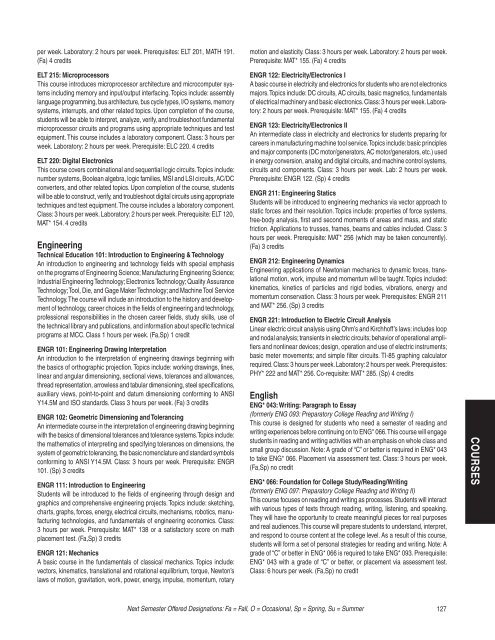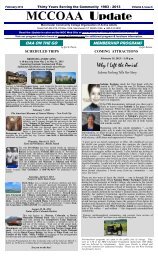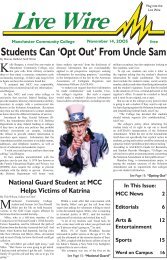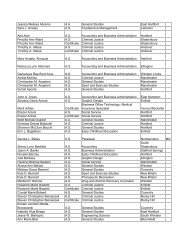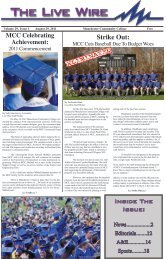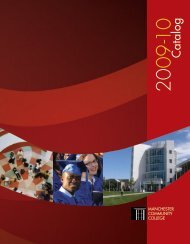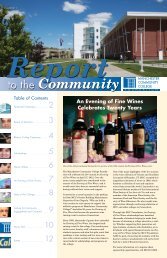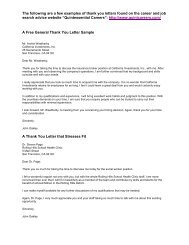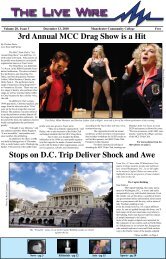Liberal Arts and Science - Manchester Community College ...
Liberal Arts and Science - Manchester Community College ...
Liberal Arts and Science - Manchester Community College ...
Create successful ePaper yourself
Turn your PDF publications into a flip-book with our unique Google optimized e-Paper software.
per week. Laboratory: 2 hours per week. Prerequisites: ELT 201, MATH 191.<br />
(Fa) 4 credits<br />
ELT 215: Microprocessors<br />
This course introduces microprocessor architecture <strong>and</strong> microcomputer systems<br />
including memory <strong>and</strong> input/output interfacing. Topics include: assembly<br />
language programming, bus architecture, bus cycle types, I/O systems, memory<br />
systems, interrupts, <strong>and</strong> other related topics. Upon completion of the course,<br />
students will be able to interpret, analyze, verify, <strong>and</strong> troubleshoot fundamental<br />
microprocessor circuits <strong>and</strong> programs using appropriate techniques <strong>and</strong> test<br />
equipment. This course includes a laboratory component. Class: 3 hours per<br />
week. Laboratory: 2 hours per week. Prerequisite: ELC 220. 4 credits<br />
ELT 220: Digital Electronics<br />
This course covers combinational <strong>and</strong> sequential logic circuits. Topics include:<br />
number systems, Boolean algebra, logic families, MSI <strong>and</strong> LSI circuits, AC/DC<br />
converters, <strong>and</strong> other related topics. Upon completion of the course, students<br />
will be able to construct, verify, <strong>and</strong> troubleshoot digital circuits using appropriate<br />
techniques <strong>and</strong> test equipment. The course includes a laboratory component.<br />
Class: 3 hours per week. Laboratory: 2 hours per week. Prerequisite: ELT 120,<br />
MAT* 154. 4 credits<br />
Engineering<br />
Technical Education 101: Introduction to Engineering & Technology<br />
An introduction to engineering <strong>and</strong> technology fields with special emphasis<br />
on the programs of Engineering <strong>Science</strong>; Manufacturing Engineering <strong>Science</strong>;<br />
Industrial Engineering Technology; Electronics Technology; Quality Assurance<br />
Technology; Tool, Die, <strong>and</strong> Gage Maker Technology; <strong>and</strong> Machine Tool Service<br />
Technology. The course will include an introduction to the history <strong>and</strong> development<br />
of technology, career choices in the fields of engineering <strong>and</strong> technology,<br />
professional responsibilities in the chosen career fields, study skills, use of<br />
the technical library <strong>and</strong> publications, <strong>and</strong> information about specific technical<br />
programs at MCC. Class 1 hours per week. (Fa,Sp) 1 credit<br />
ENGR 101: Engineering Drawing Interpretation<br />
An introduction to the interpretation of engineering drawings beginning with<br />
the basics of orthographic projection. Topics include: working drawings, lines,<br />
linear <strong>and</strong> angular dimensioning, sectional views, tolerances <strong>and</strong> allowances,<br />
thread representation, arrowless <strong>and</strong> tabular dimensioning, steel specifications,<br />
auxiliary views, point-to-point <strong>and</strong> datum dimensioning conforming to ANSI<br />
Y14.5M <strong>and</strong> ISO st<strong>and</strong>ards. Class 3 hours per week. (Fa) 3 credits<br />
ENGR 102: Geometric Dimensioning <strong>and</strong> Tolerancing<br />
An intermediate course in the interpretation of engineering drawing beginning<br />
with the basics of dimensional tolerances <strong>and</strong> tolerance systems. Topics include:<br />
the mathematics of interpreting <strong>and</strong> specifying tolerances on dimensions, the<br />
system of geometric tolerancing, the basic nomenclature <strong>and</strong> st<strong>and</strong>ard symbols<br />
conforming to ANSI Y14.5M. Class: 3 hours per week. Prerequisite: ENGR<br />
101. (Sp) 3 credits<br />
ENGR 111: Introduction to Engineering<br />
Students will be introduced to the fields of engineering through design <strong>and</strong><br />
graphics <strong>and</strong> comprehensive engineering projects. Topics include: sketching,<br />
charts, graphs, forces, energy, electrical circuits, mechanisms, robotics, manufacturing<br />
technologies, <strong>and</strong> fundamentals of engineering economics. Class:<br />
3 hours per week. Prerequisite: MAT* 138 or a satisfactory score on math<br />
placement test. (Fa,Sp) 3 credits<br />
ENGR 121: Mechanics<br />
A basic course in the fundamentals of classical mechanics. Topics include:<br />
vectors, kinematics, translational <strong>and</strong> rotational equilibrium, torque, Newton’s<br />
laws of motion, gravitation, work, power, energy, impulse, momentum, rotary<br />
motion <strong>and</strong> elasticity. Class: 3 hours per week. Laboratory: 2 hours per week.<br />
Prerequisite: MAT* 155. (Fa) 4 credits<br />
ENGR 122: Electricity/Electronics I<br />
A basic course in electricity <strong>and</strong> electronics for students who are not electronics<br />
majors. Topics include: DC circuits, AC circuits, basic magnetics, fundamentals<br />
of electrical machinery <strong>and</strong> basic electronics. Class: 3 hours per week. Laboratory:<br />
2 hours per week. Prerequisite: MAT* 155. (Fa) 4 credits<br />
ENGR 123: Electricity/Electronics II<br />
An intermediate class in electricity <strong>and</strong> electronics for students preparing for<br />
careers in manufacturing machine tool service. Topics include: basic principles<br />
<strong>and</strong> major components (DC motor/generators, AC motor/generators, etc.) used<br />
in energy conversion, analog <strong>and</strong> digital circuits, <strong>and</strong> machine control systems,<br />
circuits <strong>and</strong> components. Class: 3 hours per week. Lab: 2 hours per week.<br />
Prerequisite: ENGR 122. (Sp) 4 credits<br />
ENGR 211: Engineering Statics<br />
Students will be introduced to engineering mechanics via vector approach to<br />
static forces <strong>and</strong> their resolution. Topics include: properties of force systems,<br />
free-body analysis, first <strong>and</strong> second moments of areas <strong>and</strong> mass, <strong>and</strong> static<br />
friction. Applications to trusses, frames, beams <strong>and</strong> cables included. Class: 3<br />
hours per week. Prerequisite: MAT* 256 (which may be taken concurrently).<br />
(Fa) 3 credits<br />
ENGR 212: Engineering Dynamics<br />
Engineering applications of Newtonian mechanics to dynamic forces, translational<br />
motion, work, impulse <strong>and</strong> momentum will be taught. Topics included:<br />
kinematics, kinetics of particles <strong>and</strong> rigid bodies, vibrations, energy <strong>and</strong><br />
momentum conservation. Class: 3 hours per week. Prerequisites: ENGR 211<br />
<strong>and</strong> MAT* 256. (Sp) 3 credits<br />
ENGR 221: Introduction to Electric Circuit Analysis<br />
Linear electric circuit analysis using Ohm’s <strong>and</strong> Kirchhoff’s laws: includes loop<br />
<strong>and</strong> nodal analysis; transients in electric circuits; behavior of operational amplifiers<br />
<strong>and</strong> nonlinear devices; design, operation <strong>and</strong> use of electric instruments;<br />
basic meter movements; <strong>and</strong> simple filter circuits. TI-85 graphing calculator<br />
required. Class: 3 hours per week. Laboratory: 2 hours per week. Prerequisites:<br />
PHY* 222 <strong>and</strong> MAT* 256. Co-requisite: MAT* 285. (Sp) 4 credits<br />
English<br />
ENG* 043: Writing: Paragraph to Essay<br />
(formerly ENG 093: Preparatory <strong>College</strong> Reading <strong>and</strong> Writing I)<br />
This course is designed for students who need a semester of reading <strong>and</strong><br />
writing experiences before continuing on to ENG* 066. This course will engage<br />
students in reading <strong>and</strong> writing activities with an emphasis on whole class <strong>and</strong><br />
small group discussion. Note: A grade of “C” or better is required in ENG* 043<br />
to take ENG* 066. Placement via assessment test. Class: 3 hours per week.<br />
(Fa,Sp) no credit<br />
ENG* 066: Foundation for <strong>College</strong> Study/Reading/Writing<br />
(formerly ENG 097: Preparatory <strong>College</strong> Reading <strong>and</strong> Writing II)<br />
This course focuses on reading <strong>and</strong> writing as processes. Students will interact<br />
with various types of texts through reading, writing, listening, <strong>and</strong> speaking.<br />
They will have the opportunity to create meaningful pieces for real purposes<br />
<strong>and</strong> real audiences. This course will prepare students to underst<strong>and</strong>, interpret,<br />
<strong>and</strong> respond to course content at the college level. As a result of this course,<br />
students will form a set of personal strategies for reading <strong>and</strong> writing. Note: A<br />
grade of “C” or better in ENG* 066 is required to take ENG* 093. Prerequisite:<br />
ENG* 043 with a grade of “C” or better, or placement via assessment test.<br />
Class: 6 hours per week. (Fa,Sp) no credit<br />
Next Semester Offered Designations: Fa = Fall, O = Occasional, Sp = Spring, Su = Summer 127<br />
COURSES


